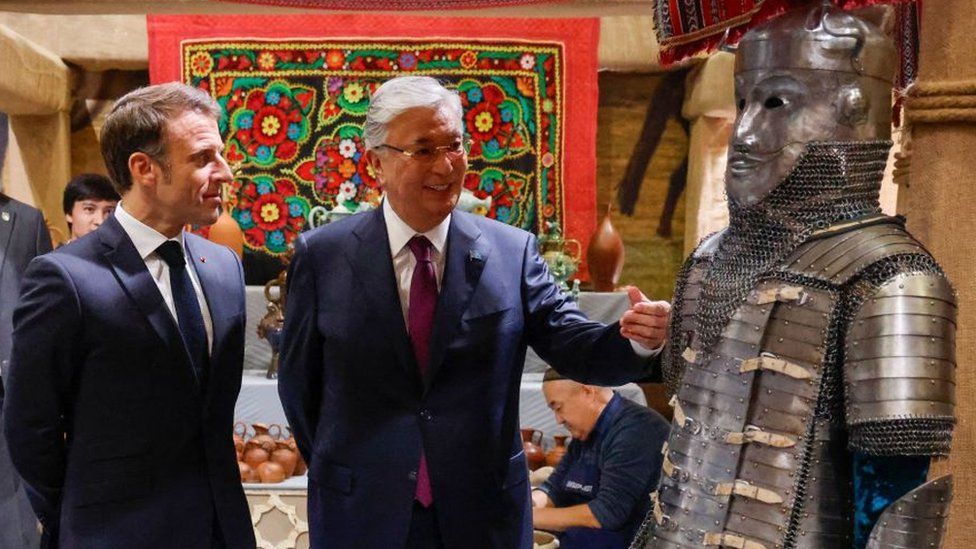Why France's Emmanuel Macron is courting Central Asia
- Published

French President Emmanuel Macron is in Central Asia, on a visit that highlights the region's increasing importance to Europe's supply of nuclear and fossil fuels.
The trip is partly an attempt to drum up business and foster links with Kazakhstan and Uzbekistan, but the key to understanding the presidential visit dates back to July.
A military coup in the West African country of Niger raised the prospect that supplies to France's vital nuclear industry might be in jeopardy.
In reality, the fears were overblown. Last year, Niger was only the second supplier of uranium to France. The first was the Central Asian country of Kazakhstan.
President Macron spent Wednesday in Kazakhstan, the world's largest producer of uranium. On Thursday, he is in Uzbekistan, like its neighbour a key producer of the fuel. Both are led by authoritarian governments.
During a press conference in Wednesday Kazakhstan President Kassym-Jomart Tokayev praised France as a "key and reliable partner". Mr Macron returned the compliment, thanking Mr Tokayev for abiding by Western sanctions on Russia.
With Russian oil exports to the EU having dropped precipitously since the invasion of Ukraine, Kazakhstan is now the EU's third-largest petroleum supplier, after Norway and the US.
But it is Central Asian uranium that is of particular interest to France, which relies on nuclear energy to generate more than 60% of its electricity, the highest share of any country. In return, Kazakhstan is seeking French knowhow as it seeks to develop its own engineers and domestic nuclear power industry.
"The Kazakhs are very interested in our nuclear expertise," said a member of the French delegation in Kazakhstan.
France's state-owned EDF is in the running to build Kazakhstan's first nuclear power plant, while the government in Paris wants French universities to establish branches in Kazakhstan, the delegate said.
France has traditionally imported a large share - though not most - of its uranium from mines operated by French companies in Niger. The future of that supply has been in doubt since a military coup brought an anti-French junta to power in July.
At the time, Paris said the coup posed no immediate threat to its energy supply, claiming that it had enough uranium stocks to last around two years.
But Mr Macron's visit underlines the jitteriness felt in Paris about knock-in effects of political instability in such a vital supplier.
The visit comes as Central Asia undergoes a profound shift in its relations with Russia, which dominated the region for over a century, says Dosym Satpayev, a political analyst based in Kazakhstan's capital Astana.
In the wake of the war in Ukraine, he said Russian influence there was diminishing.
"There is less military co-operation, the perception of Russia since the war has worsened," says Mr Satpayev. "Central Asian governments are not talking openly about it - but it is happening."
Accordingly, Russian Foreign Minister Sergei Lavrov last week denounced attempts to pull "neighbours, friends and allies" away from Moscow.
But there are tensions in the budding relationship too.
The EU and US have warned that Russia is bypassing sanctions by importing goods from the West via Central Asian countries. According to an investigation by the Organised Crime and Corruption Reporting Project (OCCRP), these include DJI drones and Western-built microchips, imported via Russian-owned subsidiaries in Kazakhstan.
The goods and components are used to fuel Russia's war effort, the OCCRP says.
As Russia beds in for a long war and Ukraine frets about Western support eroding its ability to hold off Moscow's forces, the issue of parallel imports could prove a stumbling block in the budding Central Asia-EU warming of relations.
Just as significant a theme is countering China's influence.
While Beijing still has a relatively light military presence in the region, its economic footprint in Central Asia has increased significantly in recent years. The "Belt" section of China's Belt and Road initiative (BRI) refers to overland routes from China to Europe via Central Asia.
More than 100 BRI projects have been funded in Central Asia, so that new projects are colloquially described as "Chinese", reports say.
France and the EU can never hope to match that degree of financial clout in a region that directly borders China.
But with his visit, Mr Macron hopes to exploit the strategic opportunity presented by the war in Ukraine to tempt some of Russia's traditional partners to look West.
Related Topics
- Published29 October 2023
- Published2 October 2023